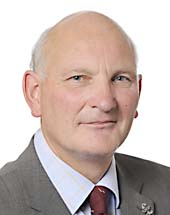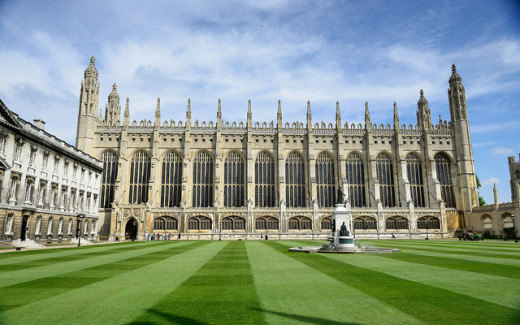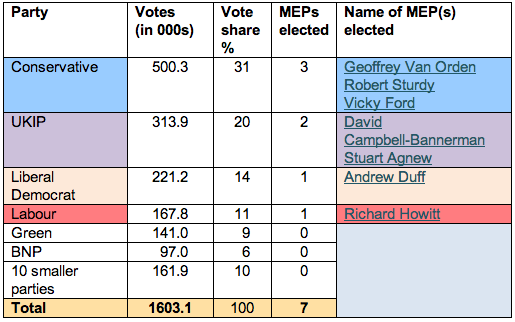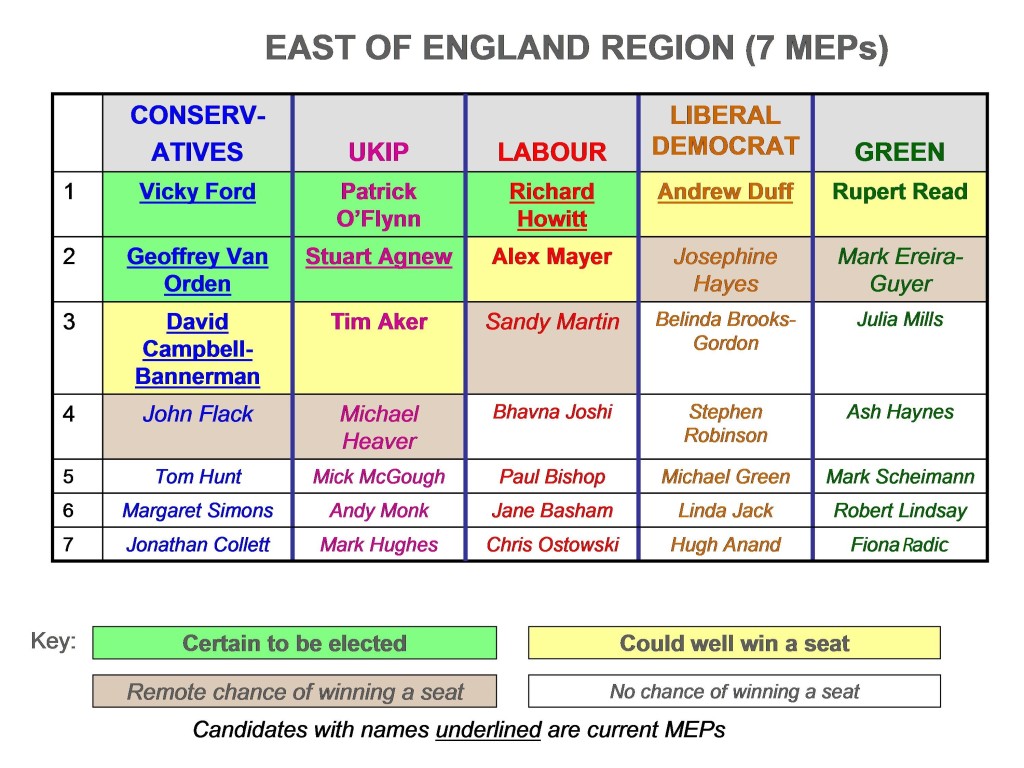Euro elections – what to expect in the East of England
On May 22nd, the East of England region will elect seven MEPs in a contest whose outcomes remain full of interest. It seems likely that two Conservatives, two UKIP, and one Labour MEP will be elected. The last two seats will depend on the balance of votes between these leading parties and the Liberal Democrats, with the Greens also potentially in contention. Continuing our series of regional updates, the Democratic Audit team outline the possibilities and explain who the major party candidates are.
The East of England region is generally seen to be good territory for the Conservatives in Westminster terms, with the Tories winning 52 of its 58 Parliamentary seats under the first past the post system in 2010. Labour currently has only two MPs in Luton, while the Liberal Democrats hold the other four non-Conservative seats in the region. However, the European elections use a List PR system that guarantees parties seats only in relation to their vote share, so nothing like the Tories’ Westminster artificially exaggerated predominance can happen here.
In fact at Euro elections the Conservative vote share has declined by more than ten percentage points since 1999, when they won over two fifths of the votes, to 2009 when it was 31%. Over the same period, UKIP have seen their voters more than double in number, with no doubt many of those coming from disaffected Conservatives. The Liberal Democrats’ vote decreased very slightly at the last election but has been relatively steady in the region since 1999. For Labour this region has not been an area of strength.
At the last elections in 2009 the Conservatives won three of seven seats in the region on less than a third of the vote, and UKIP in second place picked up two seats. The experienced Liberal Democrat MEP comfortably retained his seat and Labour also won an MEP, but neither party at that time had any chance of a second seat. The Green Party performed respectably, with centres of strength in Norwich and Cambridge, but did not do well enough to pick up a seat. The British National Party polled one in 16 votes.
Table 1: what happened last time, June 2009
Note: Our vote data are rounded to the nearest thousand votes. Exact 2009 results are available from UK Polling Report here. All incumbent MEPs are seeking re-election, except Robert Sturdy. However, David Campbell-Bannerman, who won for UKIP in 2009, is now standing as a Conservative candidate, having defected to the Tories in 2011.
What will happen in 2014?
The Conservatives always perform strongly in this region, and will be looking to maintain their current share of the vote. They should hold on to two MEPs comfortably. However, unless they achieve the unlikely feat of boosting their vote share in the face of UKIP’s national surge and a Labour recovery, but will face more of a battle to get their third placed candidate elected. UKIP will benefit from the likely collapse in the BNP vote, and may also modestly eat into the Conservative vote. For UKIP, coming first in this region is a tough ask since they lagged 10 per cent behind the Tories in 2009, although much of the BNP vote last time may go to them. They will have a hard job to gain a third MEP, unless the Liberal Democrat vote share slumps and the Greens also fade. Table 2 shows a simplified ballot which shows which candidates have a realistic chance of winning.
Table 2: Simplified ballot paper
In line with national polls, Labour’s performance should improve markedly from their low point in 2009, and they look certain to hold onto their one MEP. To win a second seat they would need to boost their vote share enough to edge the Liberal Democrats out of winning the last seat (as they did last time), fend off UKIP and hope that the Greens add no new votes. Andrew Duff for the Liberal Democrats is an experienced campaigner and with the party’s vote share likely to be squeezed on national polls he will do well indeed if he retains his seat. The Green Party are not particularly strong in the East of England, but cannot be ruled out from winning a seat in case the lost Liberal Democrat vote disproportionately falls to them.
The top parties’ candidates


 The Conservatives’ top candidate is Vicky Ford, who was first elected in 2009. She is the Conservative Spokesperson for Industry and Research on the Parliament’s ITRE committee, which also includes work on energy. She is also a member of the Economic and Monetary Affairs Committee. Information about her record as an MEP can be found on the respected Votewatch EU site, with her profile here. Previously she worked in finance and her Twitter profile is here. She looks rock solid for re-election. The Tories’ second candidate is also an incumbent MEP Geoffrey Van Orden. First elected in 1999, he is the party’s spokesman in the European Parliament for defence and security issues, and is a former soldier. His voting and attendance records can also be found on Votewatch EU here and he too is highly likely to be re-elected. David Campbell-Bannerman MEP is third on the Conservative Party list for the constituency. He defected from UKIP to the Conservatives in 2011, despite having been the main author of the UKIP 2010 General Election manifesto, and having finished third in UKIP’s last leadership election, behind Nigel Farage and Tim Congdon. However, before joining UKIP Campbell-Bannerman was previously a member of the Conservative Party and a Conservative Party councillor, so his re-defection is a homecoming of sorts. His Votewatch EU profile can be found here and his Twitter account is here.
The Conservatives’ top candidate is Vicky Ford, who was first elected in 2009. She is the Conservative Spokesperson for Industry and Research on the Parliament’s ITRE committee, which also includes work on energy. She is also a member of the Economic and Monetary Affairs Committee. Information about her record as an MEP can be found on the respected Votewatch EU site, with her profile here. Previously she worked in finance and her Twitter profile is here. She looks rock solid for re-election. The Tories’ second candidate is also an incumbent MEP Geoffrey Van Orden. First elected in 1999, he is the party’s spokesman in the European Parliament for defence and security issues, and is a former soldier. His voting and attendance records can also be found on Votewatch EU here and he too is highly likely to be re-elected. David Campbell-Bannerman MEP is third on the Conservative Party list for the constituency. He defected from UKIP to the Conservatives in 2011, despite having been the main author of the UKIP 2010 General Election manifesto, and having finished third in UKIP’s last leadership election, behind Nigel Farage and Tim Congdon. However, before joining UKIP Campbell-Bannerman was previously a member of the Conservative Party and a Conservative Party councillor, so his re-defection is a homecoming of sorts. His Votewatch EU profile can be found here and his Twitter account is here.


 UKIP’s top candidate is Patrick O’Flynn. Until recently he was Chief political commentator for the Daily Express newspaper. He is also UKIP’s current Head of Communications. Seen by many as a potential future leader of the party, he will certainly be elected. His Twitter account can be found here. The party’s second placed candidate is the incumbent MEP for the region Stuart Agnew, first elected in 2009. He is a member of the agriculture committee and a reserve member of the constitution committee. Information about his record as an MEP can be found on his Votewatch EU profile here. He is a farmer with an interest in agricultural issues, and looks certain to be re-elected. Tim Aker appears at number three on UKIP’s list for the constituency. He is currently the party’s Head of Policy, and additionally their Parliamentary candidate for Thurrock at the 2015 General Election. He seems unlikely to win this time, but if he did it is unclear whether he would give up his candidacy in Thurrock. His Twitter account can be found here.
UKIP’s top candidate is Patrick O’Flynn. Until recently he was Chief political commentator for the Daily Express newspaper. He is also UKIP’s current Head of Communications. Seen by many as a potential future leader of the party, he will certainly be elected. His Twitter account can be found here. The party’s second placed candidate is the incumbent MEP for the region Stuart Agnew, first elected in 2009. He is a member of the agriculture committee and a reserve member of the constitution committee. Information about his record as an MEP can be found on his Votewatch EU profile here. He is a farmer with an interest in agricultural issues, and looks certain to be re-elected. Tim Aker appears at number three on UKIP’s list for the constituency. He is currently the party’s Head of Policy, and additionally their Parliamentary candidate for Thurrock at the 2015 General Election. He seems unlikely to win this time, but if he did it is unclear whether he would give up his candidacy in Thurrock. His Twitter account can be found here.


 Labour’s first placed candidate is their incumbent MEP Richard Howitt who is Labour’s foreign affairs spokesman in the European Parliament and has been an MEP since 1994. Full information about his record in Brussels can be found here on his Votewatch EU profile. His Twitter profile is here and he is very likely to be re-elected. Alex Mayer is Labour’s second placed list candidate. She currently works in the media and describes herself as a Labour activist. She has some chance of being elected if Labour polls strongly (above 20 per cent), and the Liberal Democrats and Greens do not. Her Twitter profile is here. Third on Labour’s list is Sandy Martin, who is a councillor and a trade unionist, and has worked in the voluntary sector. His Twitter profile is here. He stands no realistic chance of being elected.
Labour’s first placed candidate is their incumbent MEP Richard Howitt who is Labour’s foreign affairs spokesman in the European Parliament and has been an MEP since 1994. Full information about his record in Brussels can be found here on his Votewatch EU profile. His Twitter profile is here and he is very likely to be re-elected. Alex Mayer is Labour’s second placed list candidate. She currently works in the media and describes herself as a Labour activist. She has some chance of being elected if Labour polls strongly (above 20 per cent), and the Liberal Democrats and Greens do not. Her Twitter profile is here. Third on Labour’s list is Sandy Martin, who is a councillor and a trade unionist, and has worked in the voluntary sector. His Twitter profile is here. He stands no realistic chance of being elected.

 The top Liberal Democrat candidate is the incumbent MEP Andrew Duff, who has been an active and well known MEP since 1999. He is a Founding member of the European Council on Foreign Relations (ECFR) and his Brussels record is profiled by Votewatch EU here. His Twitter account can be found here. He will do well to be re-elected this time, assuming that the Liberal Democrats can poll above 10 per cent. Josephine Hayes is the Liberal Democrats’ second placed candidate. She is a barrister educated at Oxford university, but stands no feasible chance of being elected.
The top Liberal Democrat candidate is the incumbent MEP Andrew Duff, who has been an active and well known MEP since 1999. He is a Founding member of the European Council on Foreign Relations (ECFR) and his Brussels record is profiled by Votewatch EU here. His Twitter account can be found here. He will do well to be re-elected this time, assuming that the Liberal Democrats can poll above 10 per cent. Josephine Hayes is the Liberal Democrats’ second placed candidate. She is a barrister educated at Oxford university, but stands no feasible chance of being elected.

 The Green Party’s top candidate is the academic Dr Rupert Read. He is a philosopher and campaigner at the University of East Anglia and the Chair of Green House, the environmental think tank. His twitter profile is here. He has also served as an elected councillor. He stands a reasonable outside chance of winning a seat if the Greens can grow support from its already high 2009 level. The Suffolk County Councillor Mark Ereira-Guyer is their second placed candidate, though he stands no chance of winning.
The Green Party’s top candidate is the academic Dr Rupert Read. He is a philosopher and campaigner at the University of East Anglia and the Chair of Green House, the environmental think tank. His twitter profile is here. He has also served as an elected councillor. He stands a reasonable outside chance of winning a seat if the Greens can grow support from its already high 2009 level. The Suffolk County Councillor Mark Ereira-Guyer is their second placed candidate, though he stands no chance of winning.
—
The East of England region covers East Anglia plus a substantial nearby chunk of south-east England (so as to stop that next door government region from being too big and dominant). East of England more or less fits with the Anglia TV area, and has borders that run to London to the south, the North Sea to the east, and Buckinghamshire, Milton Keynes and Northamptonshire on the east. You live in the east of England if you are in one of its big cities or towns, including Norwich, Ipswich, Cambridge, Peterborough, Bedford, Luton, Thurrock, Colchester and Southend-on-Sea; or the surrounding counties of Essex, Hertfordshire, Bedfordshire, Cambridgeshire, Norfolk and Sussex; or the unitary authority in Central Bedfordshire.
—
Note: please read our comments policy before posting. The shortened URL for this post is: https://buff.ly/1kOEy9F








 Democratic Audit's core funding is provided by the Joseph Rowntree Charitable Trust. Additional funding is provided by the London School of Economics.
Democratic Audit's core funding is provided by the Joseph Rowntree Charitable Trust. Additional funding is provided by the London School of Economics.
エンポリオアルマーニ
それを試みる。残る目標と自分自身のブランドの新しいブログを取ることはないです。小さな家を持っていただった鍛造、快適なスポット ファッション業界でエルメスは 1837 年ショップを分離した後。これらは非常に賢明なことができる大半の開始ほとんどの面で私たちカーペット エルメスですべての人の指導者と言う必要があります。
This region should be called East Anglia as it is called in England. Rather than the euro bureaucrat term East of England. Very banal.
Great your site. When i view your article and view your site have good.
I like your site.I have feel good in your content the best.
Article have good on cyber world.
Thank for sharing article.
Thank your again
Any Eastern England folk still undecided about who to vote for, this is a really useful guide to runners and riders:
https://t.co/hDdCsIC0NP
Whats likely to happen in the Eastern Region Euro elections? Democratic Audit offer their thoughts https://t.co/JjKMVKsbUL
Euro elections – what will happen in the East of England?https://t.co/OT9Nv386tT
Euro elections – what to expect in the East of England https://t.co/yfsUGKZh0t
Having just voted by post in East of England for a party that is none of the above, I think it is discourteous of Democratic Audit to assume that the result is a foregone conclusion and not even to bother to mention that there are others in the running. Clearly you use a rather narrow definition of “democratic” in your title.
Euro elections – what to expect in the East of England https://t.co/QdFBal96Ml